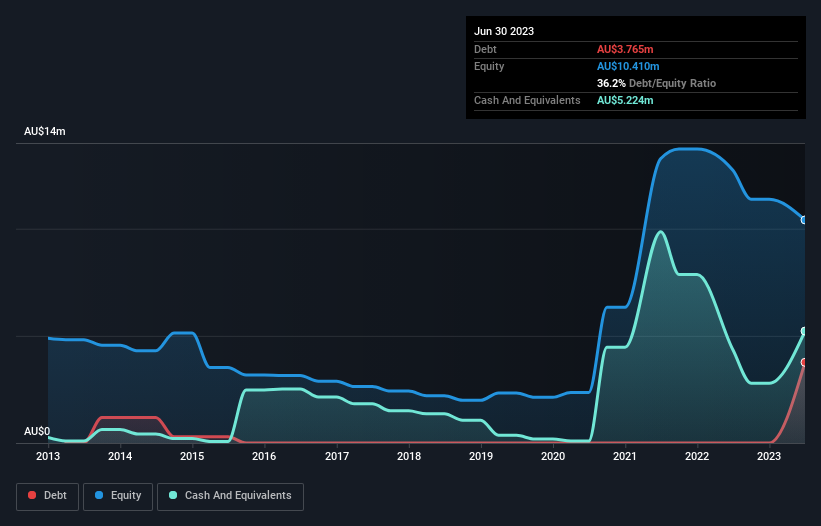
Some say volatility, rather than debt, is the best way to think about risk as an investor, but Warren Buffett famously said that 'Volatility is far from synonymous with risk.' So it seems the smart money knows that debt - which is usually involved in bankruptcies - is a very important factor, when you assess how risky a company is. We can see that Greenvale Energy Ltd (ASX:GRV) does use debt in its business. But the real question is whether this debt is making the company risky.
When Is Debt A Problem?
Debt and other liabilities become risky for a business when it cannot easily fulfill those obligations, either with free cash flow or by raising capital at an attractive price. If things get really bad, the lenders can take control of the business. While that is not too common, we often do see indebted companies permanently diluting shareholders because lenders force them to raise capital at a distressed price. Of course, the upside of debt is that it often represents cheap capital, especially when it replaces dilution in a company with the ability to reinvest at high rates of return. When we think about a company's use of debt, we first look at cash and debt together.
See our latest analysis for Greenvale Energy
How Much Debt Does Greenvale Energy Carry?
The image below, which you can click on for greater detail, shows that at June 2023 Greenvale Energy had debt of AU$3.76m, up from none in one year. However, its balance sheet shows it holds AU$5.22m in cash, so it actually has AU$1.46m net cash.

How Healthy Is Greenvale Energy's Balance Sheet?
Zooming in on the latest balance sheet data, we can see that Greenvale Energy had liabilities of AU$4.14m due within 12 months and liabilities of AU$29.5k due beyond that. Offsetting these obligations, it had cash of AU$5.22m as well as receivables valued at AU$826.6k due within 12 months. So it actually has AU$1.88m more liquid assets than total liabilities.
This surplus suggests that Greenvale Energy has a conservative balance sheet, and could probably eliminate its debt without much difficulty. Simply put, the fact that Greenvale Energy has more cash than debt is arguably a good indication that it can manage its debt safely. The balance sheet is clearly the area to focus on when you are analysing debt. But it is Greenvale Energy's earnings that will influence how the balance sheet holds up in the future. So if you're keen to discover more about its earnings, it might be worth checking out this graph of its long term earnings trend.
Since Greenvale Energy doesn't have significant operating revenue, shareholders must hope it'll sell some fossil fuels, before it runs out of money.
So How Risky Is Greenvale Energy?
Statistically speaking companies that lose money are riskier than those that make money. And we do note that Greenvale Energy had an earnings before interest and tax (EBIT) loss, over the last year. Indeed, in that time it burnt through AU$4.6m of cash and made a loss of AU$3.8m. With only AU$1.46m on the balance sheet, it would appear that its going to need to raise capital again soon. Even though its balance sheet seems sufficiently liquid, debt always makes us a little nervous if a company doesn't produce free cash flow regularly. When analysing debt levels, the balance sheet is the obvious place to start. However, not all investment risk resides within the balance sheet - far from it. For example Greenvale Energy has 6 warning signs (and 2 which are a bit concerning) we think you should know about.
When all is said and done, sometimes its easier to focus on companies that don't even need debt. Readers can access a list of growth stocks with zero net debt 100% free, right now.
New: Manage All Your Stock Portfolios in One Place
We've created the ultimate portfolio companion for stock investors, and it's free.
• Connect an unlimited number of Portfolios and see your total in one currency
• Be alerted to new Warning Signs or Risks via email or mobile
• Track the Fair Value of your stocks
Have feedback on this article? Concerned about the content? Get in touch with us directly. Alternatively, email editorial-team (at) simplywallst.com.
This article by Simply Wall St is general in nature. We provide commentary based on historical data and analyst forecasts only using an unbiased methodology and our articles are not intended to be financial advice. It does not constitute a recommendation to buy or sell any stock, and does not take account of your objectives, or your financial situation. We aim to bring you long-term focused analysis driven by fundamental data. Note that our analysis may not factor in the latest price-sensitive company announcements or qualitative material. Simply Wall St has no position in any stocks mentioned.
About ASX:GRV
Greenvale Energy
Engages in the development and exploration of mineral properties in Australia.
Flawless balance sheet moderate.
Market Insights
Community Narratives



